
archives for 02/2017
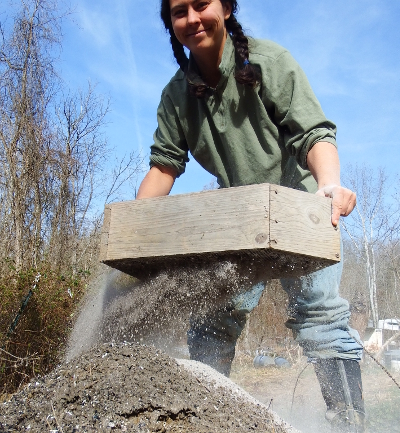 "You have to clean out your
ashes every morning too, right?" Mom asked me a few weeks ago when we
were talking about daily chores.
"You have to clean out your
ashes every morning too, right?" Mom asked me a few weeks ago when we
were talking about daily chores.
"Well, actually, no," I
answered. Due to our ultra-efficient
wood stove, we
really only get a couple of small scoops of ash even after burning a
fire most of the day and night. Our five-gallon ash bucket fills
perhaps once a month during an easy winter, or every two weeks during
really cold spells.
Five minutes sifting out
biochar and we're
ready for another month of homegrown heat. Gotta love modern technology!
Our fancy steel wedge is
still in the process of being shipped.
Filing down the rough part of
the notch made it useful for more splitting.
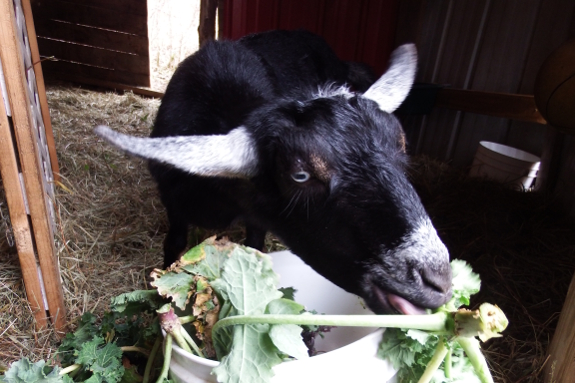
We've cut Artie down to
two thiamine shots a day. She's not 100% healed --- she still spins when she gets excited. But
she's able to eat and go about her daily business. So I've moved on to
long-term rejuvenative care --- providing as much fresh greenery as
possible.
The trouble with that
plan is pretty obvious. It's early February. The world is brown. I've
run through nearly all the easily accessible honeysuckle and have
actually been scavenging more along my daily walk.
"Would they like kale?"
Mark asked.
"Well, yeah, they'd love kale, but that's human food."
Mark gave me this look
that made it clear he'd far rather have an angst-free wife than leafy
greens with his dinner. So I started cutting the herd a bucketful of
kale every day.
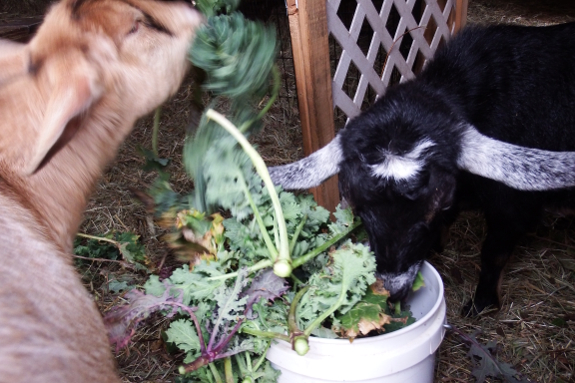
Aurora's having a hard
time figuring out how to eat kale that's not attached to the ground.
But Artemesia is older and wiser. "The leaves look tastier," she told
me. "But if you start at the stalk, you can engulf the whole thing in
one slow gulp."
Sure enough, the bucket
was soon empty, my goat's belly rounder. Here's hoping a few weeks of
fresh greenery will slow her circling a little more until this winter
trauma is a thing of the past.
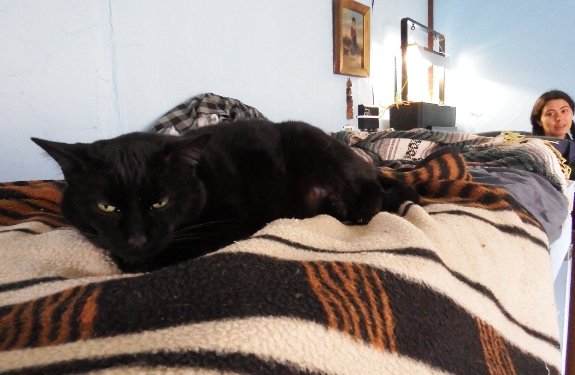
Time for six more weeks of napping.
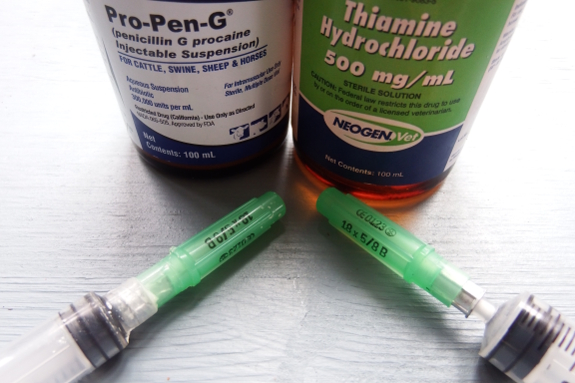
I didn't want to admit
it in my previous goat post, but Artemesia is starting to trend worse
again rather than better. The downturn began a few days after we cut
out the penicillin...which leads to the unpleasant conclusion that she
may be suffering from the more serious listeriosis (a bacterial
infection) rather than goat polio (a thiamine deficiency).
Luckily, the vet is back
in town and he was willing to talk to me on the phone rather than
making us put our poor goat in the car and drive to his office. He
suggested switching her over to a different antibiotic --- tetracycline
--- and adding in an anti-inflammatory (banamine). Meanwhile, he told
me that it probably didn't hurt her, but the dosages I'd drawn off the
internet (7.3 mL of penicillin (300,000 units per mL) and 2 mL of
thiamine (500 mg/mL) three times a day) were too high for a 73 pound
goat. Instead, he says all she needs is 3 mL of antibiotic and 1 mL of
thiamine once a day.
As the family's newly
skilled needle jabber, Mark will be glad to learn we're down to two
shots per day. I hope that Artemesia is similarly relieved by the
change in drugs and starts back onto the path to recovery.
Now that the Kubota has
proven itself we need to find a new home for the ATV.
It's broken....our neighbor
thinks it might be the timing belt.
The price would be cheap if
someone thinks they can fix her.
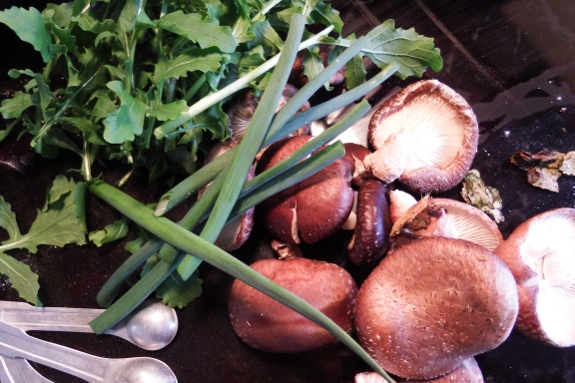
The first hint of early
spring crops in the garden seemed like a great opportunity to finally
learn how to cook an omelet.
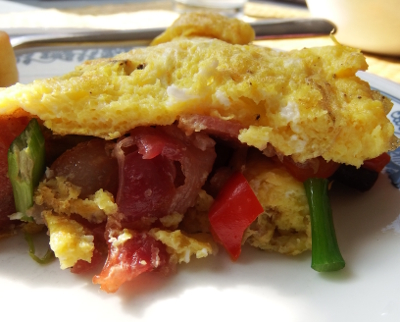 I
did a little google searching and discovered that my failures in the
past --- omelets that stick to the pan and have to be scrambled to
finish cooking --- were due to impatience. Sauteing the veggies
normally then lowering the heat to medium results in a perfect omelet
that can be flipped like a pancake then filled with Egyptian onion
greens, bacon, red peppers, shiitakes, broccoli, and arugula. Yum!
I
did a little google searching and discovered that my failures in the
past --- omelets that stick to the pan and have to be scrambled to
finish cooking --- were due to impatience. Sauteing the veggies
normally then lowering the heat to medium results in a perfect omelet
that can be flipped like a pancake then filled with Egyptian onion
greens, bacon, red peppers, shiitakes, broccoli, and arugula. Yum!
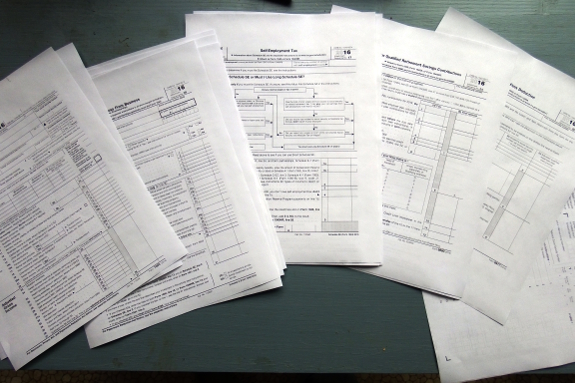
I've been spending a lot
of time worrying myself sick over Artemesia's health. I don't really
want to go into the details until everything pans out one way or
another. So, instead, I'll share the best technique I've found so far
to block out worries between hand feedings --- income tax returns.
Unfortunately, twelve
pages only took a couple of hours since I'd crunched the business
numbers in January. Now what kind of busywork will I come up with to
keep my mind off a sick goat? I'm not quite desperate enough to mop the
floor...yet.
Artemesia woke up this
morning feeling a whole lot better.
We had an early morning vet
visit from Artemesia's super nice doctor.
I asked him if he's ever had
a more remote patient while I was driving him in on the Kubota and he
confessed we are the most remote.
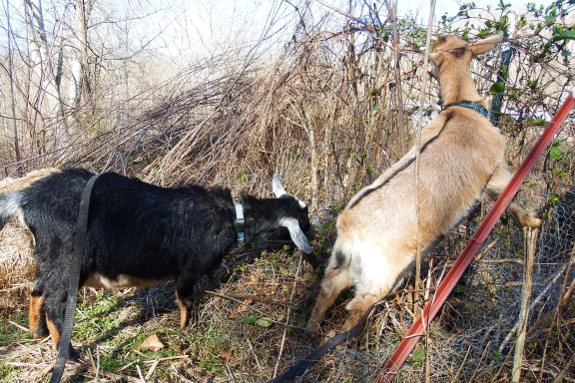
I thought the circling was bad. But watching my doe
twirl in place was nothing compared to arriving with goat breakfast in
hand Friday morning...and only having one goat meet me at the door.
Artemesia was hidden beneath the milking stand, her eyes open but no
other movement when I approached and begged her to get up. She ate a
couple of pieces of carrots out of my hand after much coaxing.
Then...nothing.
The next two days are a
bit of a blur. After shots of an anti-inflammatory, an antibiotic, and
thiamine...plus two hours of crying (on my part) and sleep (on her
part), Artemesia finally got to her feet. I was able to tempt her into
eating a few carrot slices and honeysuckle over the course of the day
by handfeeding her the way you feed paper into a shredder --- lining
everything up perfectly and sometimes sending another piece through to
dislodge the first if it gets stuck. But, overall, she appeared barely
conscious.
The next morning,
though, Artemesia was a little better...especially after I brought her
down into the trailer to warm up in front of the wood stove. (It was
eleven degrees outside, after all!) She still needed help consuming
food, but at least her appetite had returned so she was interested in eating.
Unfortunately, by
midafternoon, a heavy fever hit and she was down once again. This time,
her head was burning up but the rest of her body was shaking hard. So I
put her under my coat and held her for a couple of hours until the
fever broke.
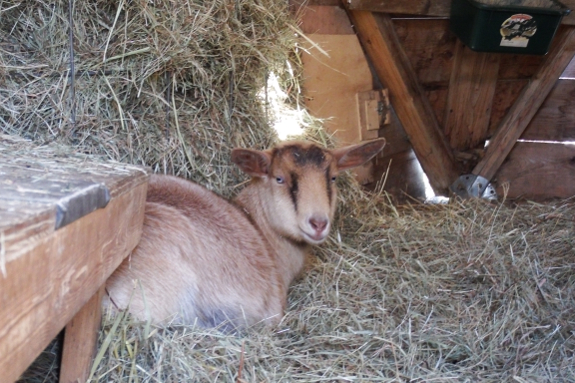
Once again, I walked her
down to the trailer. It was nearly sunset at this point and I couldn't
bear the thought of her freezing up in the barn all night while in her
weakened state. But clouds rolled in and the temperature warmed.
Meanwhile, Artemesia started feeling good enough to tramp around
underneath the elevated sofa where we'd stashed her. She wasn't
sleeping, I wasn't sleeping, and poor Aurora was crying up in the
pasture where she wasn't sleeping either. So, at half past midnight, I
limped my sick doe back up the hill and sent her to bed with her
daughter.
I was afraid to check on
Artemesia Saturday morning...but she actually looked a little better
yet. I brought an armload of honeysuckle and she actually dived in and
ate without assistance (although still slower than I would have liked).
The vet came and gave her an extra dose of B vitamins plus a steroid,
then took a fecal sample (since we both suspect worms might be wreaking
havoc on her weakened system despite a dose of copper and, later, of
Safeguard).
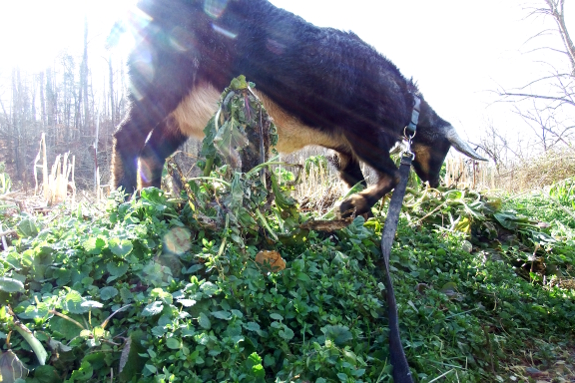
We'll have word back on
her fecal sample today. In the meantime, I'm just keeping my fingers
crossed that Artemesia continues to improve. I feel like she's already
proved the medical world wrong twice --- according to the vet, once a
goat goes down she usually doesn't get back up. Artemesia has picked
herself up and brushed herself off twice now, so I hope she's willing
to settle in for the long haul of frequent honeysuckle feedings and a
return to full health.
I managed to bottom out the
Kubota Sunday when I was driving in the doctor.
We determined today to start
hooking up the Super
Winch tomorrow so it will work on the Kubota.
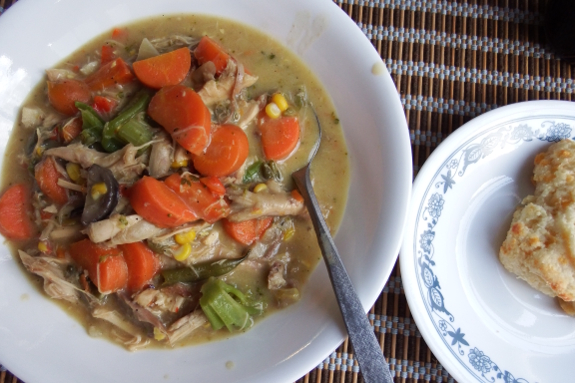
While my stomach healed
this previous fall and winter, I devolved into the world's laziest
cook. But now that I'm able to eat real food, I figured it was worth my
time to cook up last year's old layers (who have been patiently waiting
in the freezer).
Despite various other
methods tried during our early years on the farm, I now cook
all old hens slowly under moist heat before picking the flesh off
the bones and using the former in various recipes. The classic is
chicken pot pie, and this
Epicurious recipe has become my new favorite. Except, I used
homemade broth instead of storebought, shiitakes instead of button
mushrooms, far more vegetables than they call for, goat milk instead of
cream, and a different biscuit recipe baked separately instead of
together. But, I mean, it's mostly the same. And it definitely
hit the spot. Thanks, old hens!
We figured out today the Kubota needs a hitch extension to pair up the Super Winch.
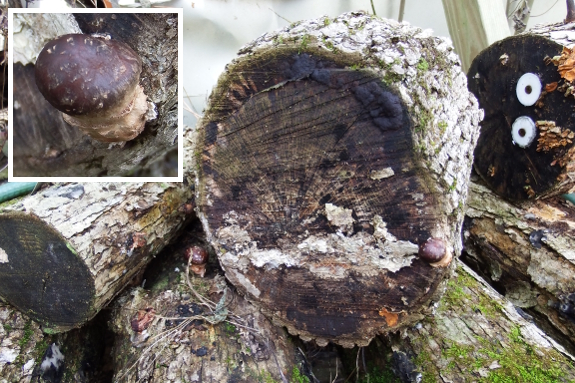
According to some book
that has since faded into obscurity in my memory, the traditional
Japanese method of reproducing shiitake mushroom logs is simple. Just
cut a fresh log and set it beneath the old...and the fungi will move
down to colonize the new substrate.
I decided to try a
slightly modified method of that technique with a mini log in April
2015. To streamline the spread of mycelium, I
placed a wet sheet of corrugated cardboard between the fresh and
colonized logs...and
sure enough the white threads of fungi soon clambered on through.
Now, seventeen months
later, there's finally a tiny mushroom budding on my never-plugged log!
Yes, that's nearly a year later than the plugged logs fruited, proof
that the traditional technique is slower, if no less sure. Still, given
the simplicity of cut-it-and-touch-to-an-existing-log technique, it
seems to merit a repeat on a slightly larger scale.
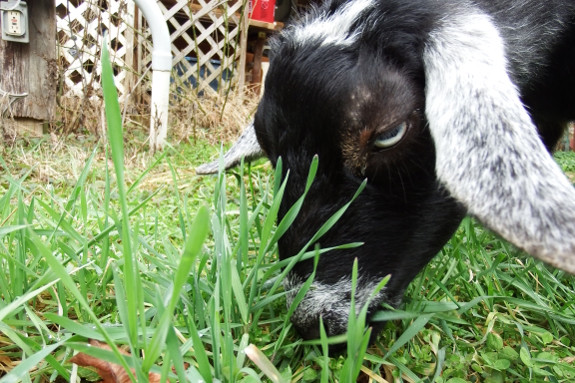
I find it easiest to
assess Artemesia's
return to health by taking her out and watching her graze. Three
days ago, she was so weak that it took a major effort to cut off leaves
of wheat, oats, or grass. She ended up gumming most of them instead of
eating them and soon gave up.
Now she's able to eat
overwintered oats...even though still
considerably more slowly than her daughter's gorging approach to
grazing. She didn't fall asleep in the middle of dining on gathered
honeysuckle either, which is also a good sign.
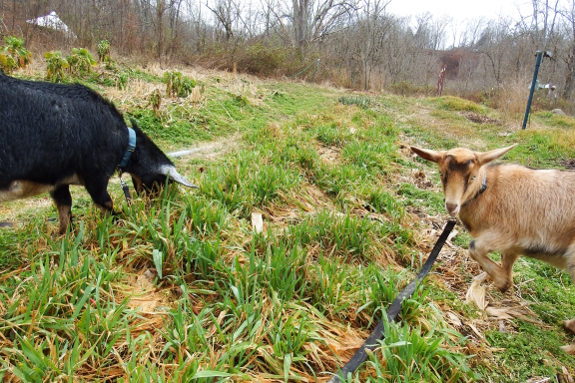
Two days ago, Artemesia
almost couldn't make it back up the small hill to her pasture after
grazing in the yard. Only after I let her nap for a couple minutes at
the midpoint did she finish the trek. This time, she still got tired
near the end but soldiered on through...planning for an
afternoon nap in the dry comfort of her barn.
All told, our poor, sick
doe is looking considerably better. You can tell from her coat that she
finally has enough energy for a little self-grooming. She's able to eat
on her own when I gather garlands of honeysuckle for in-barn
consumption. And she's even wiggling away from the needle during her
daily shots (which the vet has recommended extending for another week
to ease her back into full health). I'll continue to temper my optimism
with caution until Artemsia is a dancing picture of goat vitality
again, but I'm much relieved to see my beloved doe back on her feet and
back in her life again.
We got the hitch extension
last night which allowed the Super Winch to slide into the hitch
receiver like it was meant to do.
It pulled us out without much
effort after I secured the cable to a tree.
Such a relief to have the
Kubota out of harm's way.
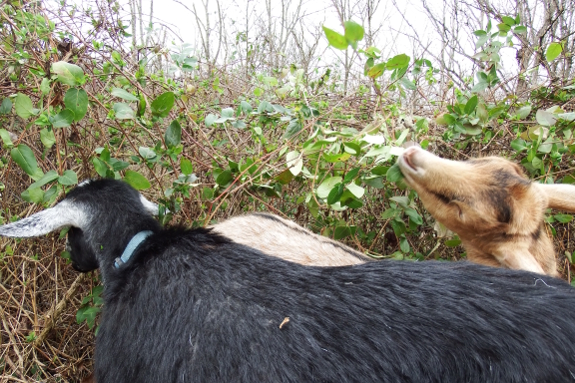
I've learned a lot from Artemesia's
case of (probably) listeriosis. With 20/20 hindsight, I wouldn't
have bred a goat who wasn't in peak health. I would have paid more
attention when extra rations weren't enough to get her weight back on.
And even though a fecal exam suggests worms aren't implicated after
all, I definitely could have dosed our doe with B vitamins and perhaps
some with other supplements as well to get her back on track early on.
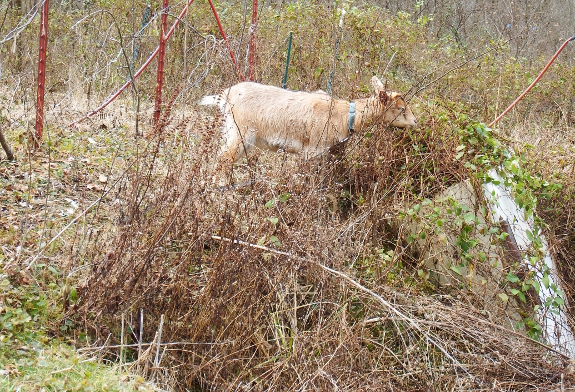
But the biggest lesson
learned is that two goats really might not be enough goats. Goats are
herd animals, and I wonder whether having only her daughter around
isn't a low-level stress that cuts into Artemesia's peace of mind.
More troubling is the
question of what would have happened if Artemesia really had died.
Aurora seemed to be independently content to stand atop her stump in
the pasture while her mother circled for hours in the barn. But as soon
as I led Artemesia out of the doeling's vicinity to warm her up by the
fire, our littlest goat descended into a crying mass of "I'm alone and
the world is awful!" Without her mother, we would have been stuck
finding an emergency goat friend or giving Aurora away (tough when her
mother had died of a possibly infectious illness) ASAP.
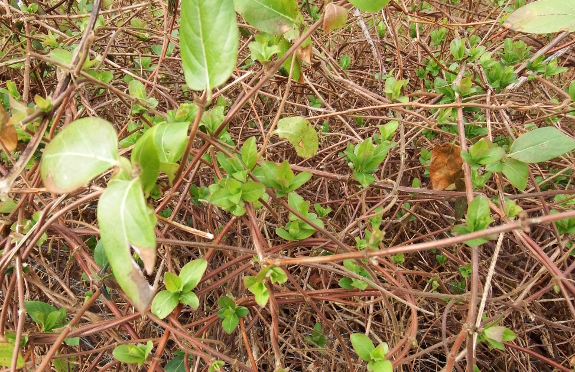
Something to ponder if
Artemesia bounces back and pops out a girl kid or two. In the meantime,
though, my attention will remain riveted to the new leaves on the
honeysuckle vines, which are providing such excellent goat fodder
during Artemesia's rebound.
One problem we had while
hooking up the Super Winch was the hitch extension getting stuck when
we slid it into the Kubota receiver.
It took two attempts at
grinding off the powder coating on the top and bottom to make it slide
easily into the receiver.
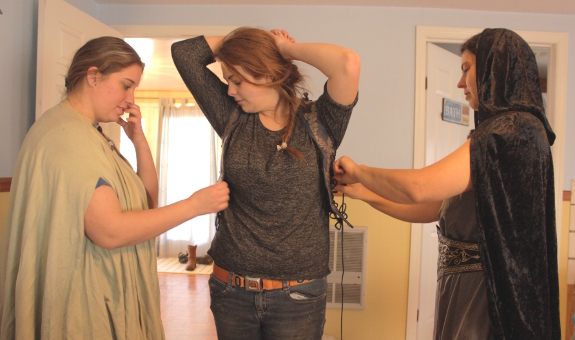
Now that I've let the
cat out of the bag about my alter-ego, the time seemed ripe to add
an author photo to Aimee's various bios. The trouble is...all of my
photos look like homesteader-Anna rather than writer-Aimee. What to do?
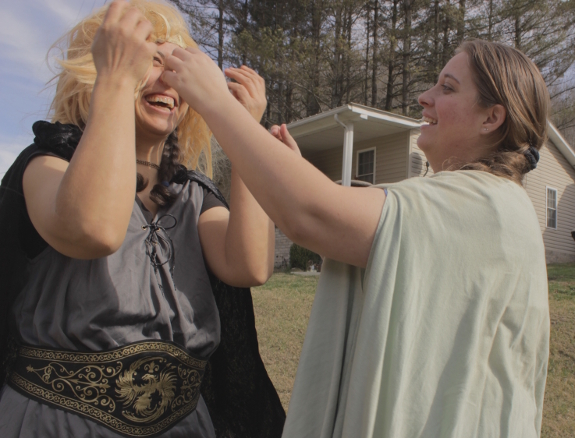
Kayla came through with
costumes, makeup, and even an enthusiastic niece to make the day even
more fun. Add in Mark and his artistic eye and we soon had more photos
than we knew what to do with.
Time to narrow them down
and give my alterego a face! I hope you'll drop by Aimee's
facebook page and vote for your favorite.
It took a little over two
weeks for it to get here but it was worth the wait.
The new Estwing Sure Split Wedge design
seems to require about half as much effort.
Now we can stop destroying
our tree felling wedges and save them for trees.
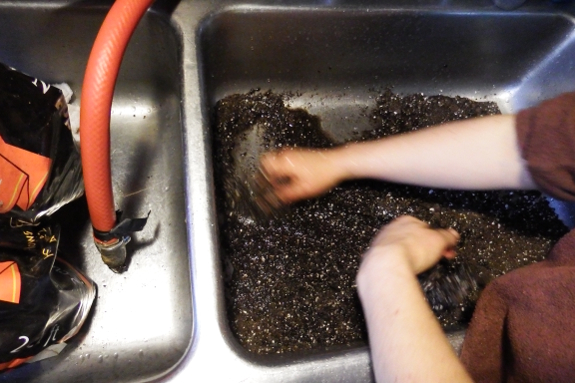
When I was in college,
one of my student jobs involved helping out at the school's arboretum.
There, I learned all kind of handy planting techniques, such as
moistening your potting soil thoroughly in the sink before starting
seeds.
Our first spring flat
--- onions --- is now on its heating
mat and ready to
grow. Next up are broccoli and peppers at the first of March.
The secret sauce of the new Estwing Steel Sure Split Wedge is the asymetrical placement of the wedge enhancers.
 After a little manipulation
with the GIMP, I think I came up with an Aimee
author photo that
looks like me...but with flare. A huge thank you to Willie Ellis for
lending us his homemade helmet to turn a so-so costume into something
special.
After a little manipulation
with the GIMP, I think I came up with an Aimee
author photo that
looks like me...but with flare. A huge thank you to Willie Ellis for
lending us his homemade helmet to turn a so-so costume into something
special.
If you're in the area,
you might check
out Willie's facebook page to see the furniture he and his brothers
create. They don't jut work with wood, they're blacksmiths too. So if you're looking for a
medieval helmet...well now you know who can hook you up!
It was easy to use jumper cables to connect the Super Winch to the Kubota power.
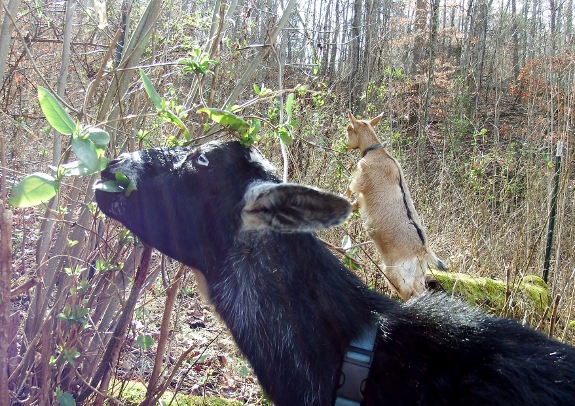
Artemesia is still getting
better, very slowly but hopefully surely. In the meantime, I've had
a lot of questions about her hypothetical kids, so I thought I'd give
you all the dirt.
According to the vet, if
Artemesia lost her kids at this point (halfway through her pregnancy),
we'd probably lose her. I assume that means there would be blood and
other obvious signs of miscarriage, of which there have been none.
So, presumably she's
still feeding miniature goatlings, which is probably why it's so hard
for her to bounce back. If she does make it to term and pops out
healthy kids, I'm seriously considering bottle feeding them (as little
as I like that thought), so we can dry her off immediately and let her
finish recuperating in peace.
In the meantime, I'm
stuffing my favorite goat with as much honeysuckle as she'll eat and am
thrilled that she's finally strong enough to consume hay out of the
manger once again. Maybe by this time next week, a walk around the yard
won't wear her out?
The Oregon battery powered chainsaw
comes through once again.
We cut down a Sycamore tree
today to propagate more mushroom logs.
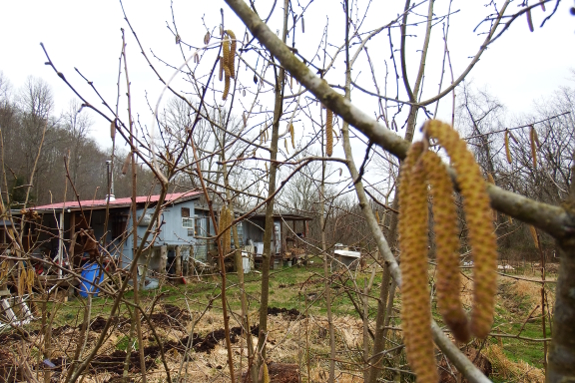
The male hazel flowers
are opening up, both on wild hazelnuts and on the hybrids in our yard.
Finally, a good source of pollen for the honeybees who have been
unusually busy during this warm winter weather!
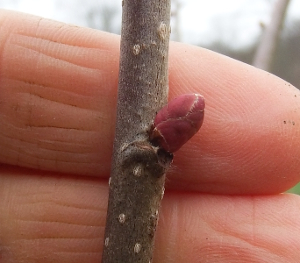 The bush pictured at the top
of this post is an unnamed
hybrid from the Arbor Day Foundation. But, in the background, next
generation named hybrids look like they might produce female
flowers this year.
The bush pictured at the top
of this post is an unnamed
hybrid from the Arbor Day Foundation. But, in the background, next
generation named hybrids look like they might produce female
flowers this year.
It's unusual for a plant to commit to female flowers before it makes
the energetically cheaper males. But when I dissected one of the plump
pink buds on the catkin-less plants I'm pretty sure I found stigmas
(female flower parts) buried deep inside. I guess I'll just have to
wait and see what these buds turn into. Maybe tasty nuts with thinner
shells?
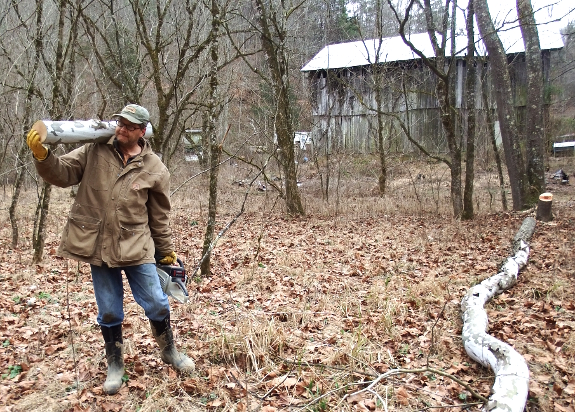
The base will turn into firewood for 2018.
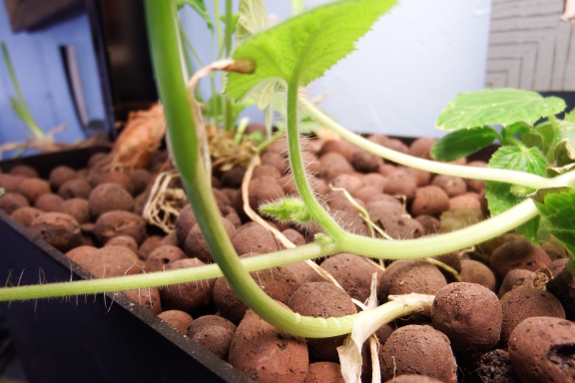
I'm ashamed to say that
my fish started ailing right about
the same time as Artemesia and my reaction was, "I can't deal with sick
fish right now." Predictably, not dealing meant they all kicked the
bucket, then rotted within the tank (I really didn't want to deal with
them) and fed the plants for a while that way.
Now that the water's
cleared back up, it's time to figure out what I did wrong and get back
on track. I suspected the issue was pH since that was the one part of
the water chemistry that was still swinging pretty widely before I
introduced the fish. Sure enough, upon testing, I found the nitrogen
had all been eaten up but the pH was a far-too-sweet 8.0.
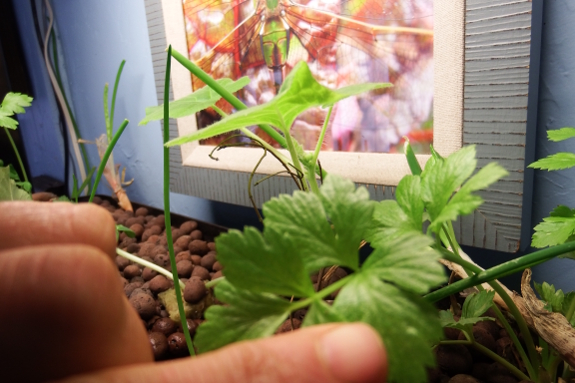
It's possible the high
pH is just a remnant of the cycling
process not quite being complete. In the past, I'd lowered pH with
lemon juice, but Aquaponic Gardening suggests citric acid (the
acid in lemon juice) is a bad choice since it kills the good bacteria
in my grow bed.
This time, I just did a partial water change (15%) using rain-barrel
water (pH 6.5), which brought the overall tank water down very
slightly. Then I used two tablespoons of vinegar to bring me back to
neutral (7.0) pH. Here's hoping the pH stays a bit steadier over the
next few days so I'll feel comfortable adding back in fish....
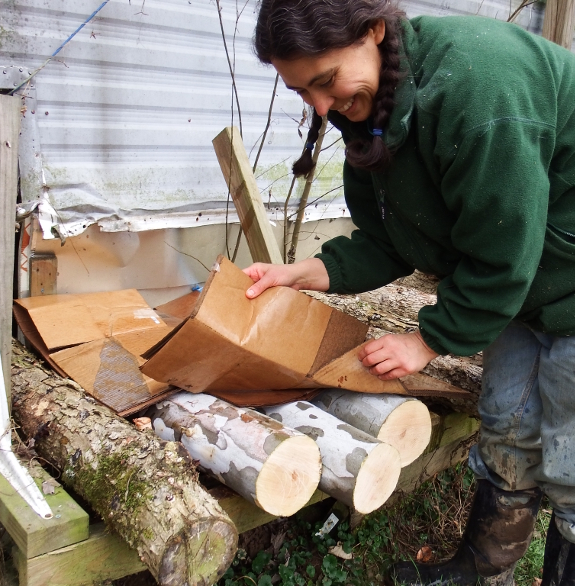
We didn't order any
spawn, so how do we plan to get fungi into our new
mushroom logs? The
idea is to riff off our
recent mini-log success and see if we can get
mycelium to run from existing logs into fresh new wood.
After bringing three
sycamore logs home to our mushroom station, I soaked corrugated
cardboard in warm water and layered the wet paper product on top of the
fresh logs. Corrugated cardboard is a perfect environment for spawn, so
it should tempt the existing fungi out of their old logs and into the
new.
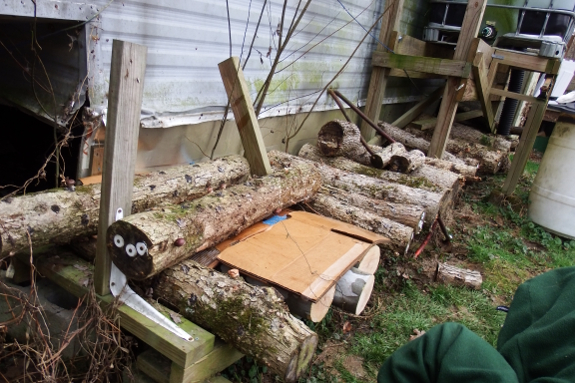
Speaking of old logs, we
stacked three of those on top of the cardboard layer. I was careful to
choose all logs of the same variety since I want to get a triple dose
of inoculation rather than having different types of shiitakes fighting
it out for the fresh wood.
As a side note, I fully
expect the three old logs to stop fruiting as soon as they notice the
fresh substrate beneath them. In general, fungi are either colonizing
new ground as fast as they can or popping out mushrooms to spread their
spores, never doing both at the same time. So if you only have a few
logs, you might not want to try this at home --- your fruiting logs
will be out of commission for as long as they're spreading spawn down
below.
Of course, this is all
hypothetical at the moment. Time to settle in to wait and see what
happens!
Our old farm truck broke a
serpentine belt today.
Lucky for me that it was
before I loaded it up with gravel.
It was nice when two people
stopped to see if I needed help.
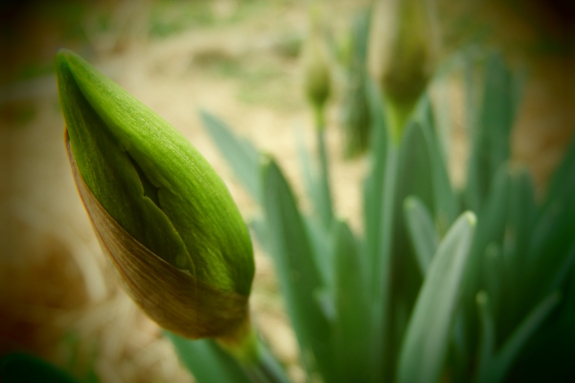
Our month-long goat
rollercoaster is on another downswing at the moment. Artemesia was
doing much better, with the exception of serious weakness in her hind
end, earlier in the week. So the vet prescribed selenium (for the
weakness) and recommended trying to take her off the antibiotics.
Within 48 hours, she was
back to circling as best she could on her wobbly hind legs. The vet,
once again, was out of town, so we put her back on antibiotics, hand
feeding, and hope. If you've got some of the latter to spare, please
send it our way.
We've been using the chain
suspended counter for a year now.
The chains are pretty much
out of the way once you get used to their location.
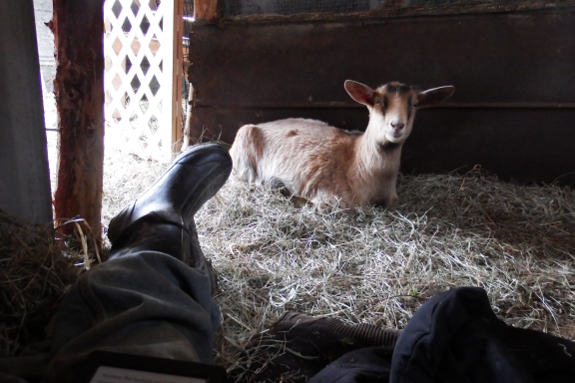
Holding a sick goat in
your arms for a long February day is like experiencing a road trip
as a child. You have a vague idea of where you're going and why, but no
control over the route or how long it will take to get there.
If you're lucky, your
seat mate brought some cud to chew and is willing to submit to the
boredom of joint napping. Otherwise, it will be a long series of "No,
don't eat my notebook. No, don't jump on your mother. No, just no."
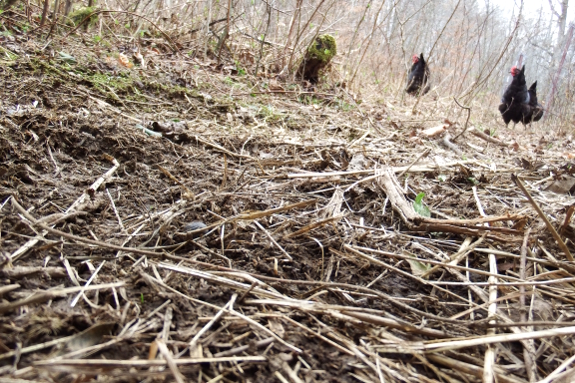
The sights alternate
between seemingly endless monotony and moments of surprising wonder.
Like when the chickens travel far outside their usual stomping grounds
and come to call.
You've never brought
enough books. Or at least not quite the right books. But it somehow
doesn't matter because you end up suspended in an endless now.
And if it's an overnight
trip? Well, then you sleep fitfully and wake early, hoping today's road
will be straighter, the path less windy, and the destination more clear.
Thank you all for the secondhand hope. It's much appreciated.
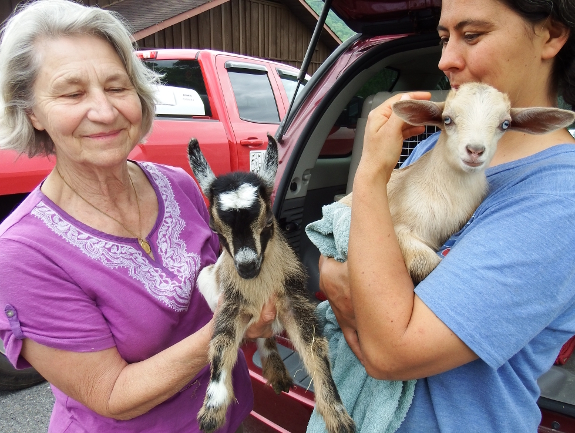
Despite a niggling sense
of deep disloyalty, we decided Saturday that Aurora needs a new friend.
So I called up the folks who were disbudding their Dwarf Nigerians at the
same time Aurora's little horns were being burnt off.
"Any chance you have a
goat for sale?" I asked.
"We've got several,"
they answered. "Come on over Monday."
Life goes on. Today
we're taking a trip to see how those little cuties look all grown up.
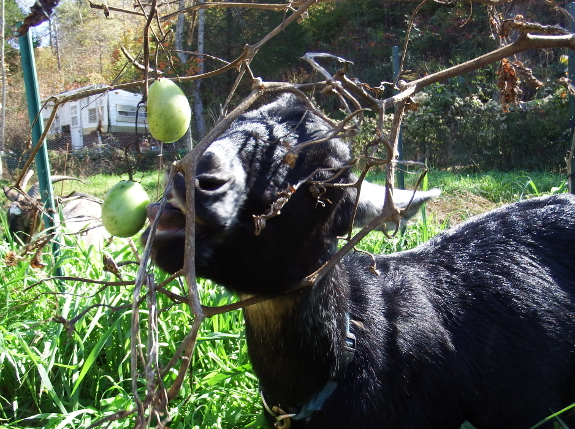
We loved you, Artemesia. You were far more than a goat and I feel lucky to have enjoyed even such a short time as part of your herd.
May the honeysuckle be copious and the pastures green on your side of the fence. We'll never forget you.
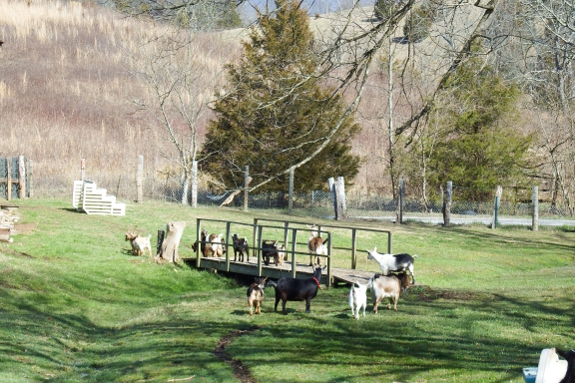
So, you know how they tell you not to jump into a new relationship
right away after a very important breakup? That's extremely good
advice. The trouble is that Aurora started screaming the minute we
carried her mother out of the barn. For her sake, we couldn't wait. So
we went to check out John and Jeanne's farm in Lee County.
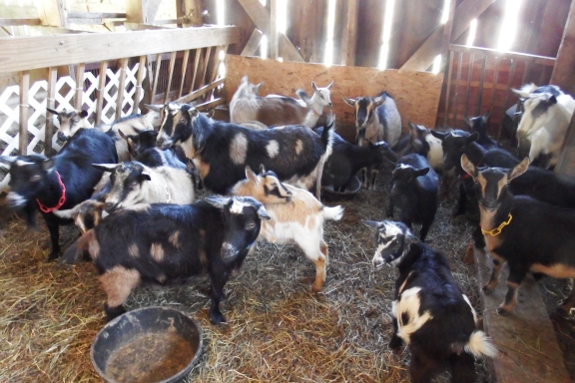
I'd already cried a couple of gallons at that point, but was doing my
best to put on a good face. Still, I have to admit I wasn't 100% as I
picked out our new doeling from a herd of twenty contenders.
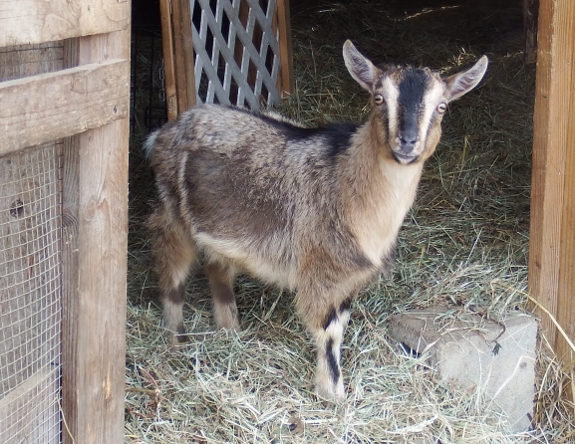
How can I be so sure I was off the mark? Well, when we got our new
doeling home, she peeed...without squatting...and I realized we'd
accidentally purchased a wether. Oops. Now what're we gonna do?
We got a little closer to
normal today after some late Winter gardening.
Thank you for your hope and
prayers during this difficult episode.
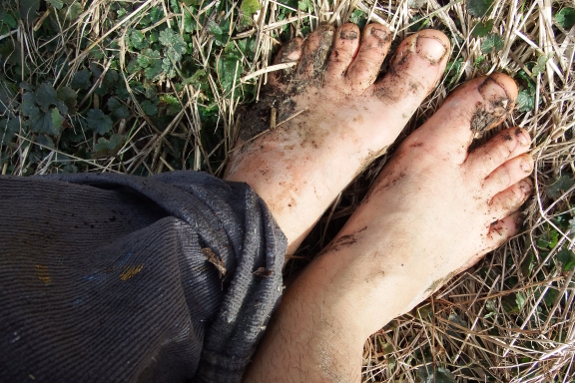
When life gets tough...I
take off my shoes. The weather gods very kindly sent a Tuesday with
high around 70, which meant bare feet and short sleeves were a perfect
fit for the garden. After a couple of hours of sun and mud and frog
calls, I was feeling astonishingly better.
The belt broke on the truck
due to a broken pulley.
A new plastic pulley with
belt and labor was 105 dollars.
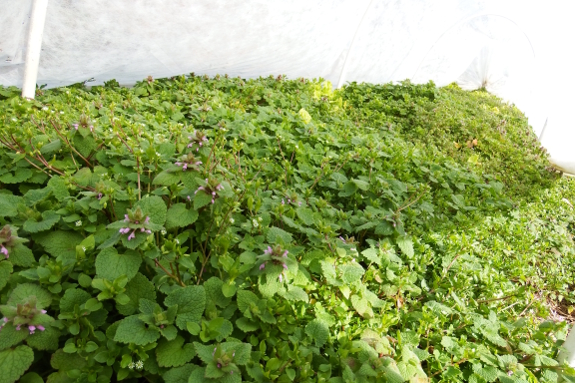
Lettuce isn't quite
hardy enough to survive even a mild zone-6 winter despite quick-hoop protection. But the
row-cover fabric produces a protected microclimate that pre-heats the
soil for spring...while also growing quite a sturdy crop of dead
nettle, chickweed, and speedwell.
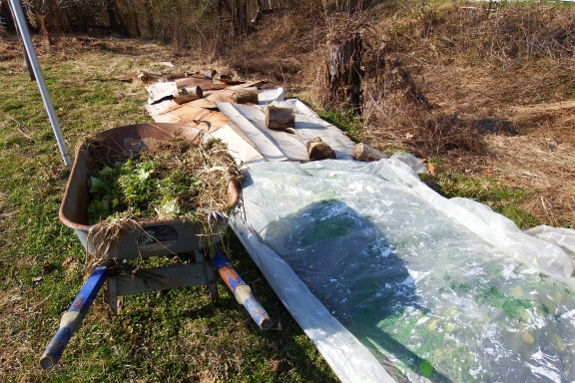
I've hand-weeded beds
like this in the past...and it's a bad idea. One of my goals for this
year is to think of smarter ways to handle body-breaking tasks, so I'm
experimenting with two early spring weed killers.
Option A: (in the
foreground) solarization, which I really don't expect
to work at such a cold time of year. Option B: a short-term cardboard
kill mulch, which I expect to weaken the plants within a couple of
weeks and make them easy to handweed.
Perhaps Mark should pull
out the flame
weeder and see if we
can come up with an experimental option C?
We got a head start on Winter
2018 with some firewood cutting today.
To prolong the battery on the
Oregon
chainsaw we stop when the power gets down to one dot out of four.
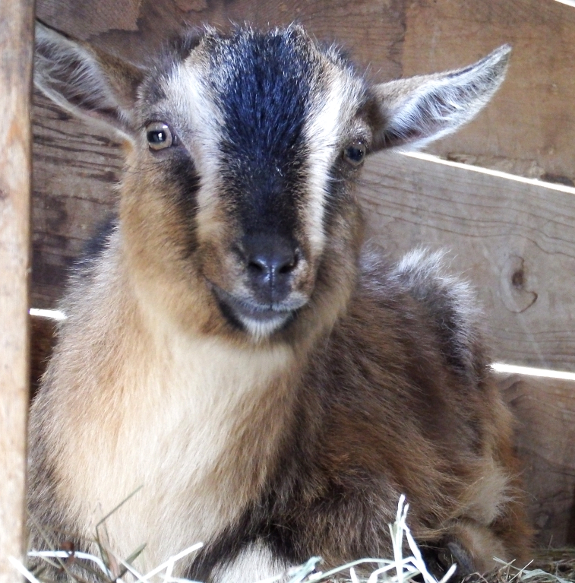
Meet Edgar, named after
Edgar Allen Poe.
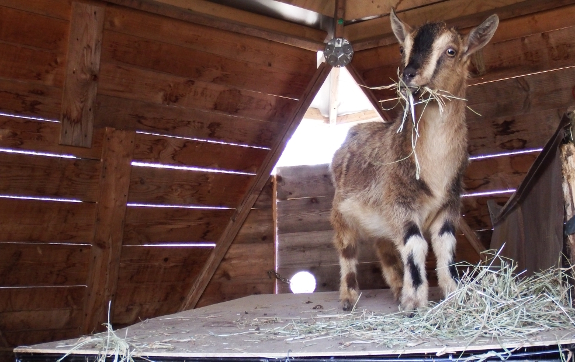
Yes, we decided to keep him. In part, this was just the
course of least resistance. By the time I'd stopped crying at the drop
of a hat, Aurora had accepted the newcomer into her herd...although
she's still chasing him away from any source of food unless I give her
something more tasty to keep her occupied.
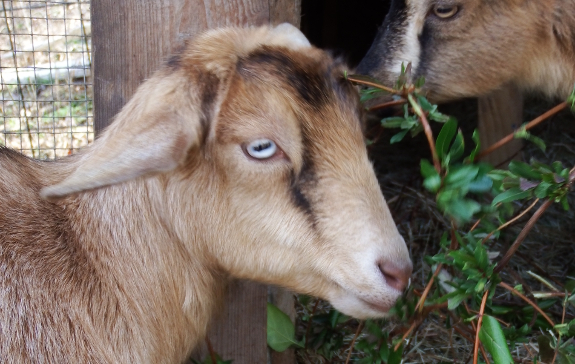
But, mostly, Edgar is
part of my plan to change several of my goatkeeping methods to prevent
another disaster like the one we recently lived through. While many
factors were likely at play, I think my biggest management error with
Artemesia was thinking I could leave a four-month-old kid with her
mother and think the former would be weaned naturally before her
high-production mother used up all of her fat and stored nutrients to
feed a growing kid.
Now, I mostly fell into that trap because I was too sick to pay
attention and didn't realize Aurora was still nursing.
But I also didn't really have many other choices at the time. With only
two
goats in the herd, they had to stay together for the sake of everyone's
sanity.
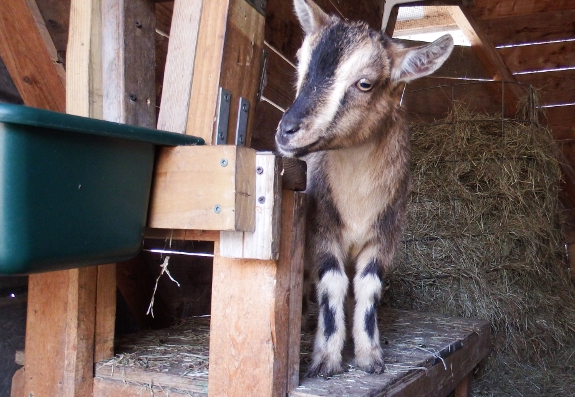
Adding a wether gives me
more options. Assuming we do find another doe to increase our herd to
three, a kid or kids could be separated to hang out with Edgar while
their mother recuperated from heavy-duty milk production. A boy kid
could be kept around longer using the same technique without worrying
he'd impregnate his mother or sisters. And I have a feeling that a herd
of more than two goats will also be less scared of predators and more
able to keep their cortisol levels low.
Yes, you read all that
right. We're adding a boy to our herd as a nanny goat. Of course that
won't be confusing. Right?
We met some nice goats today as part of our effort to expand to a herd of three.
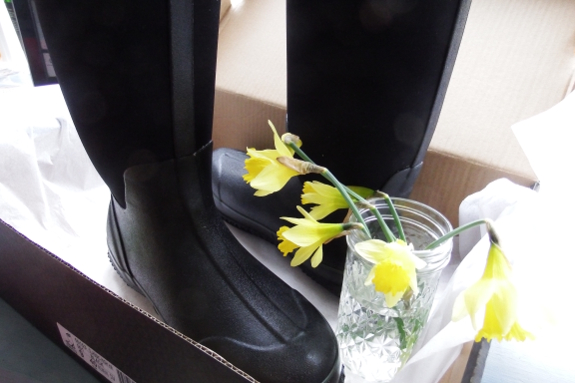
I adore Bogs boots, even though they only
last a year under our hard homesteading conditions. Every winter, I buy
a new pair and my feet stay dry until the next fall. Except this year,
when one of my six-week-old boots developed a crack right down the
middle. Yikes!
It was too late to get a
refund through Amazon, where I'd purchased the boots. But Mark had the
bright idea of going straight to the manufacturer. They have a pretty
streamlined (if a little slow) system where you input your information, using photos as both proof
of purchase and proof of defect. Then, assuming they agree that your
boot broke due to manufacturer error, a new set of boots shows up in
the mail with no further effort on your part.
I'm looking forward to
twelve more months of dry feet!
One of our hens has been
cheating on us!
We found this stash under a
decommissioned wheelbarrow near the junk pile.
A definite drawback to letting
the flock free range in the flood plain.
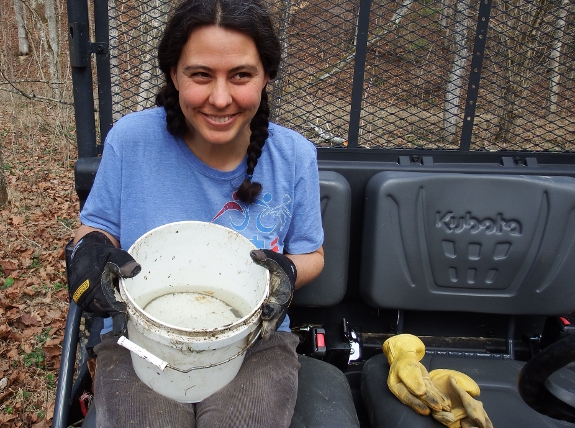
The pH
in my aquaponics setup keeps fluctuating and trending alkaline,
which left me with a bit of a conundrum. I have a feeling what I need
is to put a few fish in to get the biology really working. But I'm
leery of driving an hour to the fish store for finned friends who will
likely end up dead.
Then I had a thought. We
live in limestone country and our streams are quite alkaline. In fact,
when I tested our creek water, I discovered it was actually sweeter
than the water in our aquaponics tank (8.2 versus 7.8). Maybe some
minnows would survive well enough to get my system up and running?
My first attempted
failed miserably. No, not because the tank killed the fish. I captured
one small minnow and didn't notice until I got the bucket home that
there was also a hefty caddisfly larva who had come along for the
ride. "Well, that'll be fun to observe," I thought and put the two
together into a small container to let the water rise to room
temperature before introducing them to the tank.
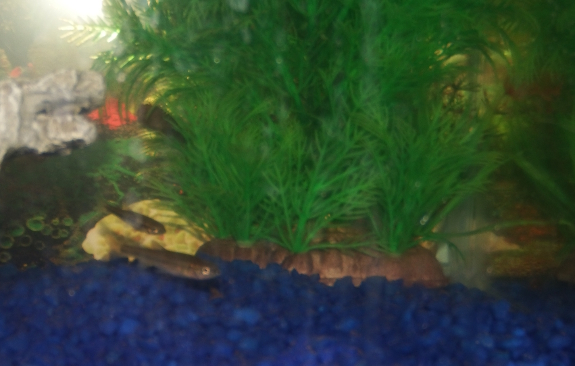
An hour later, the fish
was gone. Apparently caddisfly larvae eat baby fish. See, I'm learning
things already!
Anyway, I headed back to
the creek and scooped up two larger minnows the second time around. I
figured I could always put them back if they survive and I want to
upgrade later. But, to my surprise, these minnows are less shy and more
entertaining than the guppies were. So maybe my aquarium will turn into
a native fauna observation tank?
We noticed Robins in the
garden this week.
It must mean they are
breaking away from big flocks to select a mate.
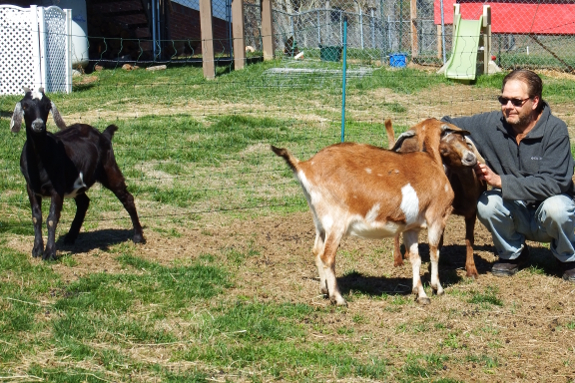
While searching for a
friend for Aurora, I stumbled across Michael's Mini-Nubians in Fall
Branch, Tennessee. This mom-and-pop operation actually has a
two-year-old, pregnant doe available that we could have taken home
right away and Baby was definitely a sweetheart. But I was a bit leery
of adding a horned goat back into our herd...and I really don't think I
could handle the angst of a pregnancy right away. So, instead, we put
down a deposit on one of the herd's unborn kids.
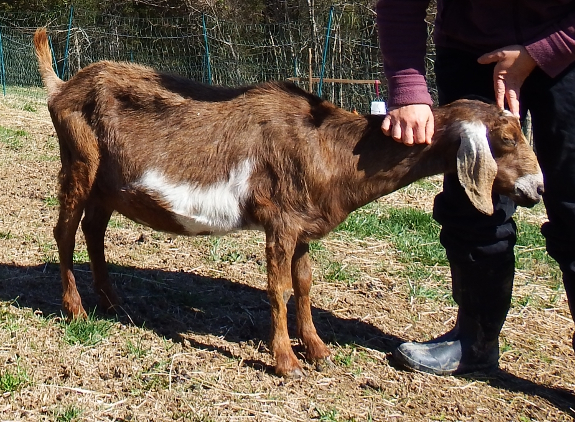
We can't be sure who
will throw girls, but our first choice as mother is Pixie, aka Green
Gables Prancing Pixie.
Pixie is a venerable old lady at nine years of age and her teats were
rather tremendous for a mini (a good thing for ease of milking). But
her major selling point is that she's a sweetheart --- I think she
would have stood there and let me pet her for as long as I felt able.
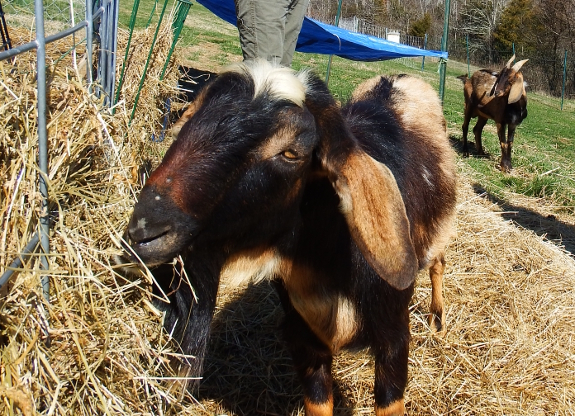
The father of most of
Michael's upcoming herdlings this year is Green
Gables Indian War Song. As you can tell from their
official names, both parents are bred by probably the premier
Mini-Nubian operation in the U.S., so it seemed like a very good deal
to be able buy one of their offspring for $250 weaned.
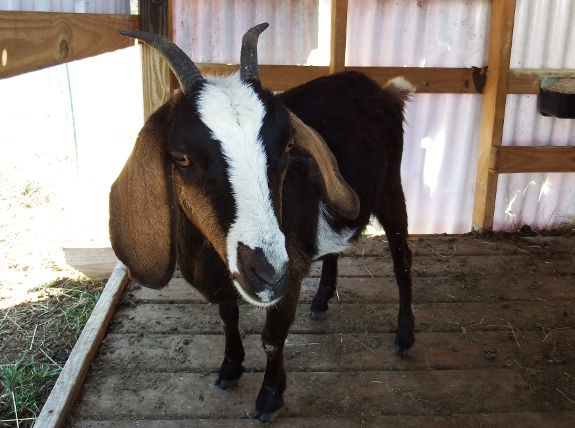
Michael doesn't have a
website yet, but I'd be glad to pass along your contact information if
you live in the area and are interested in Baby (shown above) or in any
of this year's kids. The latter are slated to be born in late March and
will be ready for new homes in late June (or much earlier if you'd
prefer to go the bottle route for $50 off the purchase price). Just email me and I'll email him.
For everyone else ---
stay tuned for baby shots in about a month. No one will ever be able to
replace Artemesia in our hearts, but I have a feeling Pixie's daughter
could come close. Perhaps we'll name her Pixel?
I parked the truck on an incline to stop a small fuel leak long enough to epoxy it.
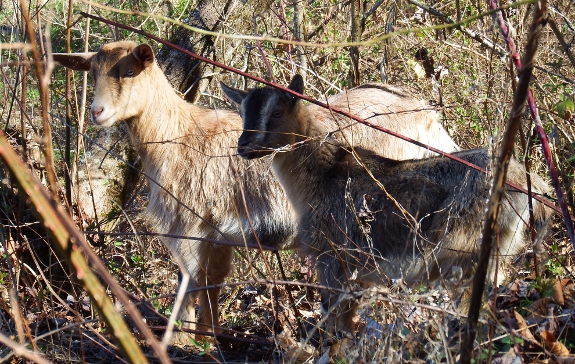
For over a month, there
have been no goat outings and no joy when I walked up to the goat barn (usually
at least half a dozen times a day). So even though taking our new
herd out to graze makes me melancholy now, it's also a relief.
Goats eating wild grub
the way they ought to! Blue sky! Green leaves! Terror-stricken
attitudes when a carefully trained dog walks by! Okay, so we could have
done without that last bit, but you get the gist.
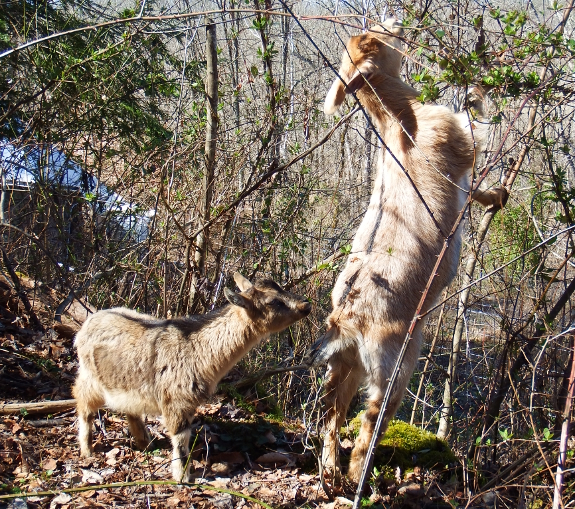
At least there's a new
puzzle to keep me busy. Edgar
came to us from a herd far too large for much human contact, so he has
the aspect of a feral cat. It doesn't help that Aurora is quick to
assert her herd-queen status and head butt him if he dares to eat
anywhere near her regal presence.
So I've taken it slow.
By the second day, our wether was willing to eat with me in the barn,
by the fourth day he'd nosed my fingers in search of a handout. Day
five saw me tentatively taking Aurora and Edgar out to graze in the
woods --- no way could I catch the latter to collar him, but he stuck
like glue to Aurora's side and was no management problem at all. Day
six I petted him while he was looking the other way and Edgar didn't
run off like a shot. Who knows what day seven will bring?
The new seed station makes use of the space underneath the elevated couch.
Want more in-depth information? Browse through our books.
Or explore more posts by date or by subject.
About us: Anna Hess and Mark Hamilton spent over a decade living self-sufficiently in the mountains of Virginia before moving north to start over from scratch in the foothills of Ohio. They've experimented with permaculture, no-till gardening, trailersteading, home-based microbusinesses and much more, writing about their adventures in both blogs and books.

